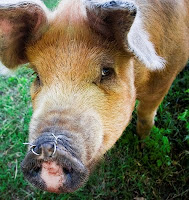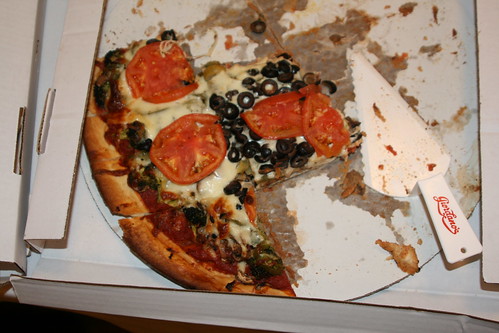I Ate Pizza for Breakfast
5 Nutritional Travesties That Aren’t So Bad
The thought pops into your head before you even stop chewing – this is a nutritional travesty. We know eating healthy food and loading up on colorful fruits and veggies is the path to feeling good and preventing disease, but navigating this nutritional war zone without tripping a mine occasionally isn’t realistic. Before you succumb to poor eating habits and start thinking of yourself a hopeless nutritional wreck, consider that some guilt may be unnecessary.
Not every indulgence has to be bad. If you’ve had a bad food day, letting go of the guilt may be warranted. Here are five healthy sins for which you can be forgiven.
1. I ate pizza for breakfast.
It happens. After an evening enjoying a pie, there’s usually some left over, which means in the morning you’re faced with that odd piece. It’s cold, it’s covered in congealed cheese, and it’s delicious. But pizza for breakfast doesn’t necessarily destroy your good health habits.
First, if you made it yourself you’re better off. You’ll be more in control of the salt and fat content. Second, tomatoes are high in nutrition. Best if made with fresh tomatoes, sauce has powerful lycopene which is known primarily for its cancer defense. Finally, filling up on non-traditional items for breakfast isn’t all bad. While calling Dominoes at 9 AM isn’t recommended, a single slice can provide protein and vegetables and the energy to get you to lunch—in fact, it’s better for you than many common breakfast options like giant muffins, “breakfast” pastries, or greasy drive-thru breakfast favorites that send you into a slump by mid-morning.
2. I had dessert.
It may be that you are celebrating. After all, April 28th is National Blueberry Pie Day. Is it a national holiday? You bet. Should it be? Who knows? Regardless, you don’t have to feel guilt for being pie-triotic. Pie can be a nutritional boon. Blueberries, particularly wild, are high in nutritional and antioxidant content, and even in a crust it counts as a serving. Jack Kerouac journeyed across the country and relied on diner pie for meals—it was cheap, delicious and provided the perfect compact nutrient delivery system. Try this nutritionally friendly Wild Blueberry Pie and hit the road.
 If it was chocolate you indulged in, you can also be forgiven, especially if it was dark chocolate. While there is no official cutoff that defines “dark”, European rules specify a minimum of 35% cocoa solids, and cocoa percentages can go as high as 86% and even 99% depending on your tolerance. The good news is that it contains healthy flavonoids – just like those found in fruits and vegetables. Small portions of dark chocolate are credited with improved blood vessel flow and improved blood pressure. Moderation, of course, is the key to gaining the advantages and not suffering from the extra calories or replacing other healthy foods.
If it was chocolate you indulged in, you can also be forgiven, especially if it was dark chocolate. While there is no official cutoff that defines “dark”, European rules specify a minimum of 35% cocoa solids, and cocoa percentages can go as high as 86% and even 99% depending on your tolerance. The good news is that it contains healthy flavonoids – just like those found in fruits and vegetables. Small portions of dark chocolate are credited with improved blood vessel flow and improved blood pressure. Moderation, of course, is the key to gaining the advantages and not suffering from the extra calories or replacing other healthy foods.
If neither pie nor chocolate is the source of your dessert guilt, you may be the victim of refined sugar, processed additives, and consequential blood sugar spikes. Take heart. Whole Food Resources offers some “remedies” for overindulgence in everything from sugar to fat to alcohol. They recommend reversing the negative effects of a sweet-fest by drinking ginger tea with soy sauce, or eating cured pickles.
3. I ate (guacamole, potatoes, eggs, wine).
Some foods that are considered bad for us are really food that is getting a bad rap. If these foods were part of a diet indulgence, you can start feeling better about yourself immediately upon understanding their potent nutritional benefits—or, you can start integrating them into your diet and leaving the guilt at the kitchen door.

Avocados. Guacamole lovers already know that while avocados are considered to be high in fat, they should be lauded as a strong dietary complement. They actually contain monsaturated fat that is good for your heart and compounds that could prevent cancer. This nut in veggie clothing is high in antioxidants, and it may help the body absorb the nutrients from other foods (like the lycopene in the tomato salsa that may have accompanied them.) Make guacamole yourself to get all the benefits and leave the additives behind.
Eggs. We go to a lot of trouble to avoid eggs and their evil yellow centers in an effort to lower cholesterol. In fact, eggs, yolks included, are a low-calorie, nutritionally-dense food that contains high quality protein, antioxidants and vital nutrients such as folate, B12 and choline. Those strictly watching cholesterol are smart to eliminate yolks, but most of us could do a lot worse than indulging in eggs on occasion, either as part of an omelet or a quiche or in a dish all on their own.
Potatoes. Perceived as a dietary killjoy, potatoes are actually a wonderful round package of nutrients – especially with the skin on, which contains 60 different types of phytochemicals and vitamins. Potatoes are also known to be high in potassium. They get no points for adding color to your plate, so they are often dismissed when it comes to nutrition, but it’s the frying and the butter that really does the damage. Russets in particular have huge nutritional benefits and high antioxidant content says this dailymail.com article on surprise superfoods. Even the calories are moderate, provided you hold the dollop of sour cream.
Red wine. It’s no secret that red wine has received the super-nutrient nod, thanks to reports that say moderate coiffing can protect against heart disease. Drinking up to two glasses of red wine a day has also been thought to improve brain power. Resveratrol, its powerful ingredient, has been discovered to be a dietary hero and that’s a much relied-upon fact in circulation any given night at a wine bar or dinner party. Increased consumption, however, does not mean increased benefit. Read more about Where We are with Red Wine Research.
4. I ate fast food.
It could be the most unforgivable food sin. Fast in synonymous with high calorie, high fat, and sky-high salt content. In fact, the typical fast food meal supplies about 1,150 calories – an entire day’s worth of calories for someone watching their intake, with most of the calories coming from fat. Even if you skip the burger, fast food chicken and fish is breaded and fried, and most fast-food meals lack complex carbohydrates and fiber. It can be a tough nutritional truth to swallow, especially after the dust settles and the eating is done.
But you can be redeemed from a fast food slip up.
According to nutritional experts, the damage to your health can be undone. Over the long run, we can reverse heart disease risk by following either a low-fat vegetarian regimen or a Mediterranean diet that’s rich in healthy fats, whole grains, and vegetables. According to Prevention.com, “As long as it took for you to get to an unhealthy state, that’s about how long it takes to become disease free.” In fact, reversing nutritional damage, particularly that which comes with age, has tremendous interest to researchers.
The late Dr. James Joseph, co-author of The Color Code, has reported that a diet of blueberries may improve motor skills and reverse the short-term memory loss that comes with aging such as Alzheimer’s. Dr. Barbara Shukitt-Hale, a USDA Staff Scientist in the Laboratory of Neuroscience, USDA-ARS, Human Nutrition Research Center on Aging at Tufts University, has done research that has had a significant impact on the world of nutrition and anti-aging by studying the effects of a diet supplemented with berries and finding that they could reverse functional age-related deficits in motor and cognitive behavior. It may be we can begin turning back the clock on poor health as soon as we come out of our fast food coma.
5. I just plain ate a lot – all day.
We all have days where we start eating, and we keep eating, regardless of the time of day, the nutritional content or the caloric intake. Must we go to the back of the nutritional line and start from scratch to meet our goals for good health and disease prevention? Or, can we recover from a high intake day?
We can.
If it is the extra weight from a day of indulgence that concerns you most, consider this: recent studies indicate that for some of us, the more we eat, the more we burn by unconsciously moving incrementally more, fidgeting, or taking the stairs and bustling about more doing everyday activities. Our bodies simply respond to the added caloric intake naturally.
 Unfortunately, this is not the case for everyone. Some of us, alas, do not have this calorie-balancing metabolism. If you are one of these people, there are other reasons not to worry. Taking in a lot of calories can mean more energy for workouts, and it can often lead us to feel less hungry the following day to compensate. And, as many “cheat” diet enthusiasts will tell you, if a day or two of nutrition and diet denial keeps you on track in the long term, that’s the most important thing.
Unfortunately, this is not the case for everyone. Some of us, alas, do not have this calorie-balancing metabolism. If you are one of these people, there are other reasons not to worry. Taking in a lot of calories can mean more energy for workouts, and it can often lead us to feel less hungry the following day to compensate. And, as many “cheat” diet enthusiasts will tell you, if a day or two of nutrition and diet denial keeps you on track in the long term, that’s the most important thing.
If it isn’t caloric value but nutrition you’ve eschewed, there are still reasons not to despair. Your health is a result of what you do over time, and our bodies respond immediately to resuming good health and nutritional habits. Eating poorly or overeating one day a week gives you a solid 86% rate on good eating habits. And, as we mentioned above, healthy food is such a powerful nutritional tool that it can reverse health woes associated with aging and poor health. So return to your colorful nutritional plates full of fruits and veggies with a clear conscience. You’ll be back in good health in the time it takes you to ask for seconds.
How Bad Are Your Health Vices? Check yourself at Prevention.com.



